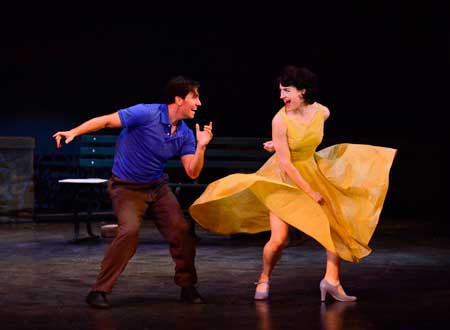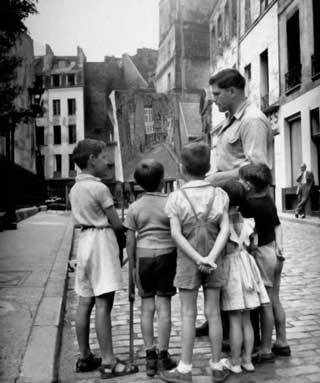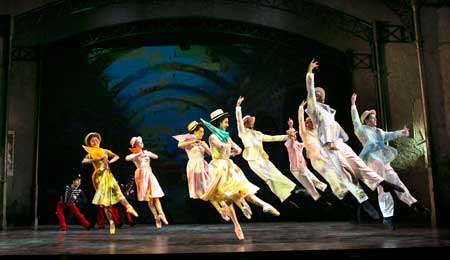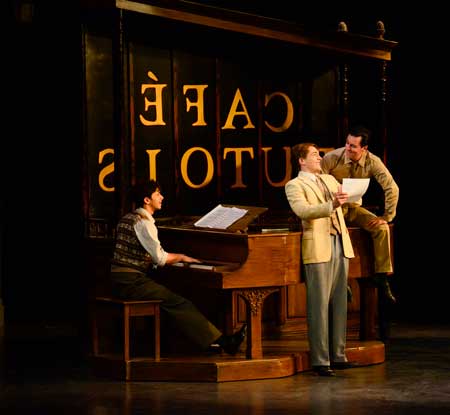Musical (2015)
Music by George Gershwin
Lyrics by Ira Gershwin
Book by Craig Lucas
Inspired by the film An American in Paris (1951)
Director and Choreographer: Jeffry Denman
Music Director: David Lamoureux
Scenic Design: David L. Arsenault; Lighting Desing: Richard Latta; Costume Design: Theresa Ham; Sound Design: Kevin Heard; Wig/Hair/Makeup Design: Kurt Alger, Emilia Marin; Projection Design: Elaine J. McCarthy; Associate Choreographer/Dance Captain: Ashley Marinelli; Production Stage Manager: Karen Parlato
Ogunquit Playhouse
Ogunquit, Maine
July 11 – August 4, 2018
With Clyde Alves (Jerry Mulligan), Julie Eicher (Lise Dassin), Stephen Brower (Henri Baurel), Jeremy Greenbaum (Adam Hochberg), Laurie Wells (Milo Davenport), Joanna Glushak (Madame Baurel), Neal Mayer (Monsieur Baurel), Rob Brinkmann (Mr. Z), April Leonhard (Olga); Ensemble: Brittany Bigelow, Kyle DuPree, Drew Fountain, Kory Geller, Sally Glaze, Sarah Gold, Hanna Jennens, Kourtney Keitt, Akina Kitazawa, Joshua LaMar, Chelsea Langevin, SarahGrace Mariani, Ashley Marinelli, Connor McRory, Brayden Newby, Spencer Ramirez

Julie Eicher as Lise
in “An American in Paris”
Photo: Gary Ng
Courtesy of Ogunquit Playhouse
The well-known 1951 film on which this recent musical adaptation is based features the incomparably radiant and weightless Gene Kelly in the title role as aspiring artist Jerry Mulligan, with Oscar Levant as his piannistic sidekick Adam Cook and Leslie Caron as Lise Bouvier, the balletic object of his affections. Mulligan’s attentions get drawn away by rich female sponsor Milo Roberts, while Bouvier’s affections are tested by her longtime commitment to Henri Baurel. Kelly’s infectious charm is framed poignantly by Levant’s wit and music deftness, while Caron provides a winsomely intoxicating romantic focus.

Photo: Connecticut Post (2011)
The plot of the current show, with a new book by playwright Craig Lucas, takes off from the original, adds some dramatic elements, and modestly alters some of the names. Lise Dassin (Julie Eicher), is a magnetic young dancer in post World War II France who is caught between the affectionate attentions of artist Jerry Mulligan (Clyde Alves) and Henri Baurel (Stephen Brower), with a covert longing by pianist Adam Hochberg (Jeremy Greenbaum). Meanwhile Mulligan is sought after by a rich American female sponsor, Milo Davenport (Laurie Wells), and Dassin is more seriously pursued by Henri, with earnest support of his domineering mother Madame Baurel (Joanna Glushak) and his dutiful father Monsieur Baurel (Neal Mayer).
The identification of the effects of Nazism in Paris during the war is made evident early on through the expert set design by David L. Arsenault and projection design by Elaine J. McCarthy, give a clue to Lucas’ subtly but effectively altered aspects of the narrative which become vividly evident as the plot develops.

Photo: Julia Russell
Courtesy of Ogunquit Playhouse
To say that there is good dancing in this show is like saying that there is good music in Mozart’s The Marriage of Figaro. The choreographic work is so outstanding that one both revels in it and gapes in wonder. The complexity and nuance of virtually every moment on stage is stunningly and inventively conceived. It is hard to imagine how all the pieces, so intricately realized, are fit together, but they do, marvelously. It is remarkable that, for a show which is running for less than a month, this degree of choreographic complexity comes off so vividly and effortlessly.
In addition to being expertly conceived and marvelously put together, the production is also a tremendous amount of fun to watch. The cast seems not only to be entirely on their game but to be enjoying every moment. Clearly much credit to the overall exuberant quality of the production goes to director and choreographer Jeffry Denman. But clearly he has worked intimately with set designer David L. Arsenault, whose set elements often fly around the stage with the dancers, and projection designer Elaine J. McCarthy, to create a coherently dynamic whole.
As artist Jerry, Clyde Alves is fleet-footed, lively and full of bounce; he even manages a back handspring. His dancing is extremely competent, and though his style is less weightless than Gene Kelly’s (whose isn’t?), his sheer exuberance and general ease, and clear delight in the role, carry the day.

Julie Eicher is a wonderfully hypnotic and affecting Lise, and provides, in addition to an expertly executed balletic role, a magnetic presence as the tenderly appealing young woman torn between the affections of the exuberant painter, the dutiful family friend, and the distantly longing pianist. Again, in realizing an extremely competent but grounded approach, Eicher’s dancing here is truly lovely though one would not characterize it as having the sort of willowy weightlessness one associates with typical prima ballerina performances.
Clearly, director and choreographer Jeffry Denman has sought, in this production, a more down-to-earth and less uniquely balletic approach than the Broadway production reputedly exhibited, and the results are successful and evocative. The dance performances are exquisitely done but never come off as precious or effete, which seems to be the intent. Again, the complexity and refinement of the choreographic design is astoundingly good and all of the parts fit together beautifully, including the effort to create the effect of a exuberant, but clearly terrestrial, landscape.

Stephen Brower as Henri
Clyde Alves as Jerry
in “An American in Paris”
Photo: Gary Ng
Courtesy of Ogunquit Playhouse
As Henri Baurel, Lise’s dutiful French suitor, Stephen Brower is charmingly amusing, graceful in temper and in dancing, and perfectly suited to be the guy who means to do the right thing but doesn’t quite fit the bill.
In the original Oscar Levant role, here as Adam Hochberg rather than Adam Cook – the last name given a more Jewish twist for this adaptation than was offered in the film – Jeremy Greenbaum is endearingly captivating, perfectly channeling Ira Gershwin’s sensibilities in But Not For Me and They Can’t Take That Away From Me. Greenbaum has an infectious charm and effectively helps to glue together the quietly tragic underside of the story with his gentle sensibilities.
As Madame Baurel, Henri’s overbearing mother, Joanna Glushak is both terrifyingly domineering and hilarious. When she delivers, in a strident monotone, the canned speeches at a social gathering, it is fabulously transfixing.
As Monsieur Baurel, Neal Mayer has one of the greatest single lines when he gets to finally respond to Henri’s long-hidden desire to perform and he carries it off with perfect panache.
Laurie Wells does a finely aristocratic job as the seductive patroness, Milo Davenport.
This is an outstanding production in so many ways, with choreography that is simply out of this world, and it’s amazing how effectively this complex production has been carried off for a relatively short run. Don’t miss it.
– BADMan
Leave a Reply